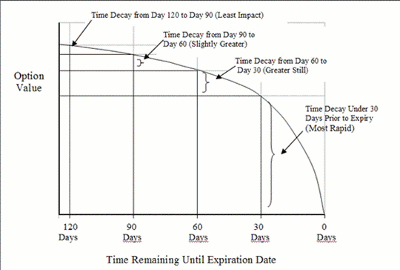Tyler Craig of TylersTrading.com explains that time decay, as measured by the option "Greek" Theta, can rob hard-earned profits from option buyers, but reminds that Theta is a friend to option sellers.
It's not uncommon for discussions on the option Greeks to border on the mundane. A discourse replete with facts and figures runs the risk of becoming forgetful to the reader. Sometimes the behavior of the ever-important Greeks is best illustrated with a story, so consider the following parable about the "Theta thief."
Though the lifespan of an option contract varies from one week to multiple years, its death date is known from inception. Following its creation by the powers that be and its subsequent listing on an options exchange, a clock begins to tick, marking the passage of time until the inevitable end.
Though each option possesses a set amount of extrinsic value (sometimes called time value) when it first comes into being, a sneaky little thief called Theta relentlessly hounds the option and steals a modicum of extrinsic value every day.
At first, Theta is a bit timid, only looking to steal insignificant amounts of value from the option. With months to expiration, Theta has plenty of time to pilfer from the extrinsic value stash. Over time, however, Theta's boldness builds.
With each passing day, he brazenly withdraws increasing amounts of money from the option's dwindling supply of extrinsic value. The rate of his thievery increases at an exponential rate.
Interestingly, Theta doesn't steal from every option at the same pace, even if they have the same expiration date. Because at-the-money options are endowed with more extrinsic value than any other strike price, they are the most susceptible to Theta's predatory antics.
When first introduced to the role of time decay in option pricing, many traders erroneously assume it affects all strike prices equally. Those with a relatively nascent career in the options mart cite the popularized time-decay curve (shown below) as the rationale for avoiding holding options too close to expiration.
As the conventional wisdom goes, short-term options lose value much quicker than long-term options. When owning options, traders often steer clear of the last few weeks prior to expiration for fear of time decay, or Theta burn, rearing its ugly head to steal or at least chip away at their hard-earned profits. Often times, however, this fear is unfounded.
An option's premium consists of both intrinsic and extrinsic value. While it's usually stated that time decay whittles away at an option's premium, a more accurate statement would be that time decay whittles away at an option's extrinsic value. At the end of the day, intrinsic value is immune and need not worry about the clock.
To largely inoculate themselves against Theta's thievery, traders typically
look to buy longer-dated
options.
While Theta is the foe of option buyers, it acts as a friend to option sellers. As a matter of fact, all the money Theta is removing from the option's value is going directly into the pocket of the option seller.
This, of course, explains, in part, the appeal for option-selling strategies such as covered calls and naked puts. They enable you to dispatch the sneaky thief to incrementally steal extrinsic value and deliver it directly to your brokerage account. Traders looking to maximize Theta's pirating will look to sell shorter-dated options.
Whether you're venturing into the options market with a penchant for speculation or risk aversion, don't forget the role the Theta thief will play throughout the duration of your trade.
By Tyler Craig of TylersTrading.com











